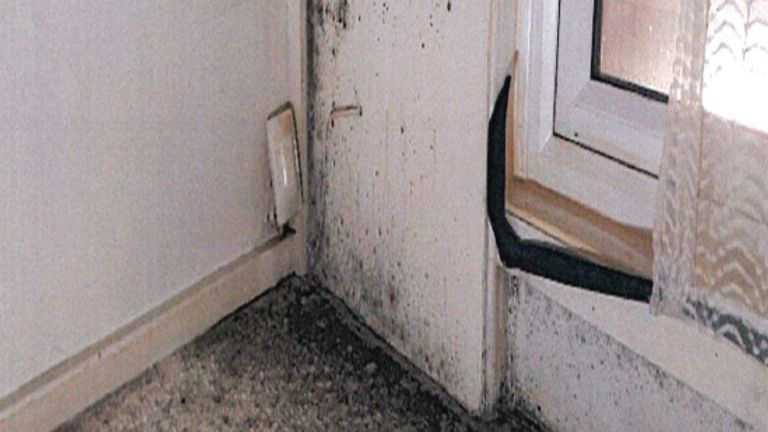A law to force social landlords to investigate and fix hazards within a set timescale will be phased in from October, the government has announced.
The legislation is named after two-year-old Awaab Ishak, who died in December 2020 from a respiratory condition caused by prolonged exposure to mould in the social home his family rented in Rochdale, Greater Manchester.
Politics latest: No 10 defends new US ambassador
The tragedy sparked widespread calls for change after an inquest heard how action to treat and prevent the mould was not taken – despite the boy’s father repeatedly raising the issue with Rochdale Boroughwide Housing (RBH).
In response, the then Conservative government pledged to introduce Awaab’s Law to hold social landlords to account, with Labour vowing to implement and extend it to the private sector if they won the general election, which they did last July.
Setting out the next steps, Deputy Prime Minister and Housing Secretary Angela Rayner said it will come into force in the social rented sector from October this year.
It means social landlords will be required to address damp and mould hazards that present a significant risk of harm to tenants within fixed timescales.
The timescales were not set out in Ms Rayner’s statement.
A consultation under the Tories had proposed forcing landlords to investigate the problems within 14 days, and fix them within a further seven, but it is not clear if this will still be the case – with more details expected later down the line.
Ms Rayner said that from October 2025, social landlords will also have to address all emergency repairs, whether they relate to damp and mould or any other hazard, as soon as possible and within no longer than 24 hours.
What happens after 2025?
From 2026, the requirements will apply to a wider range of non-emergency hazards beyond damp and mould, including excess cold and excess heat, falls, structural collapse and fire, electrical and hygiene hazards.
Then in 2027, the requirements of Awaab’s Law will expand to the remaining hazards as defined by the Housing Health and Safety Rating System (excluding overcrowding).
This includes issues like keeping a property secure against intruders, inadequate lighting and exposure to noise.
‘Delays put people at risk’
Ms Rayner said that the phased approach “in no way means that social landlords have any leeway” when it comes to meeting their existing duties to keep tenants safe, amid criticism from housing campaigners.
She said the sequencing is required so protections to damp and mould can be introduced earlier than would be the case if the government sought to apply Awaab’s Law to all hazards from the outset.
But Polly Neate, chief executive of Shelter, said: “Four years after Awaab’s death, and nearly two years after the Social Housing Regulation Act received Royal Assent, today’s announcement means social housing tenants will have to wait years longer for this vital protection.
“These delays to implementation represent a real risk to the health and safety of tenants, and puts lives at risk.”
Awwab’s Law follows campaigning from his parents, who said they hoped it would stop other families going through what they did.
There are widespread issues with damp, mould and disrepair across homes in England, which are in the worst condition of all European countries while being more expensive to buy, according to an analysis by the Home Builders Federation.
Complaints over social housing increased by over 300% in 2024, while almost half of private renters are said to be living with damp or mould, Sky News has previously reported.
Read More:
Children living in temporary accommodation for more than five years
‘Raise funding for social homes or fail to meet building targets’
It is not clear when Awaab’s Law could be extended to the private sector, as promised in Labour’s manifesto. The government said this will be done through its Renters’ Rights Bill, which is currently going through parliament.
Ministers are also consulting on a new Decent Homes Standard, which sets minimum standards for the condition of social homes, and will separately legislate to require social landlords to carry out electrical safety checks and appliance inspections.


